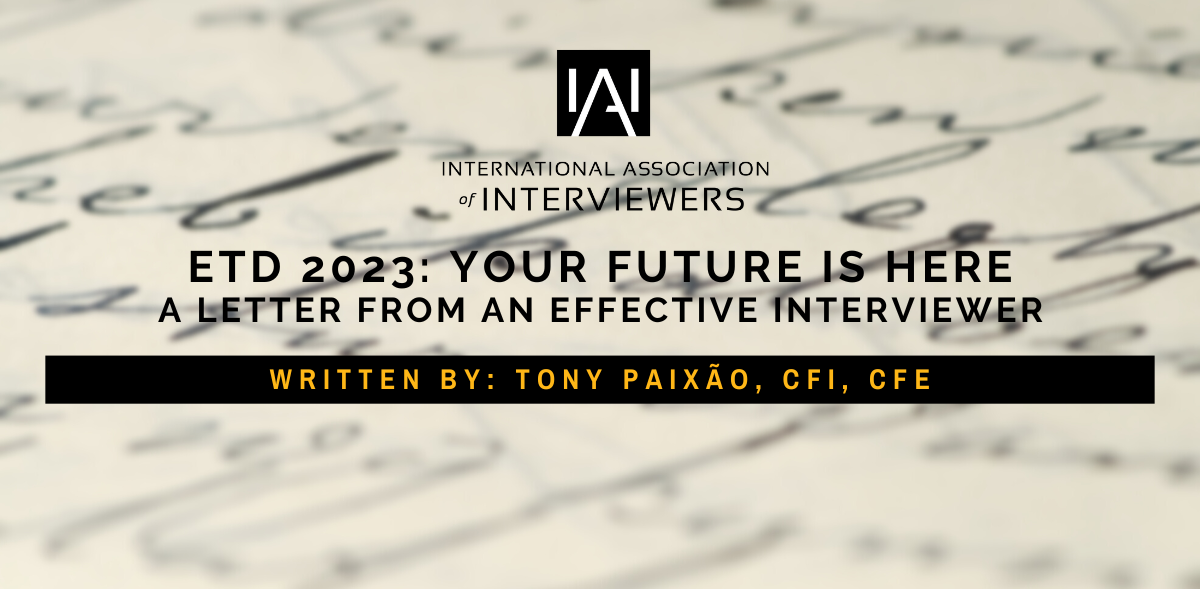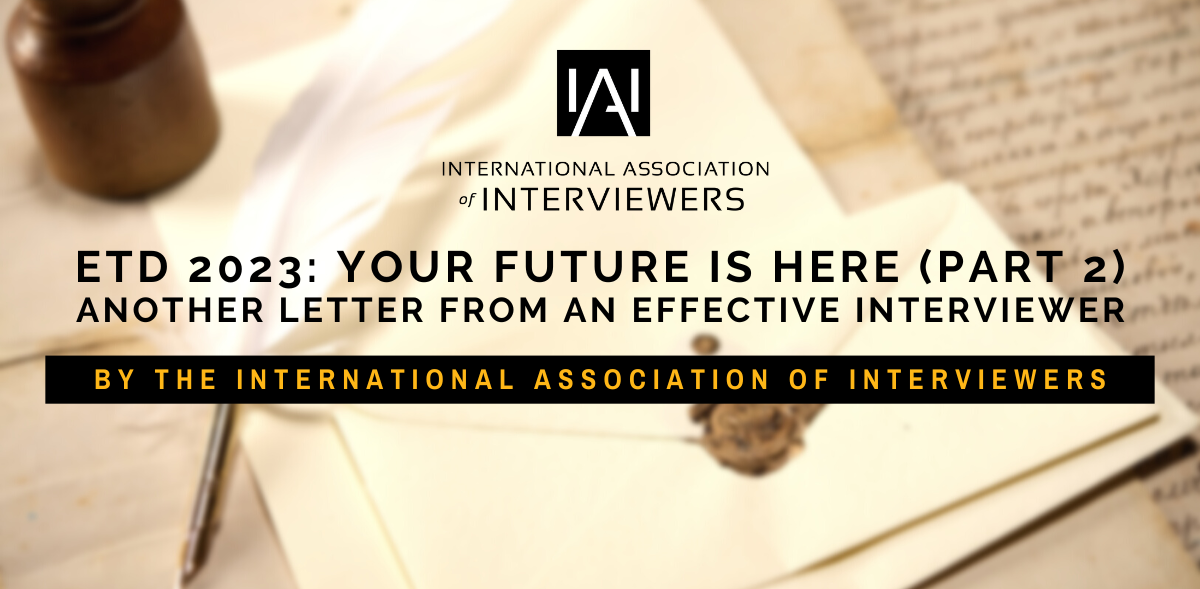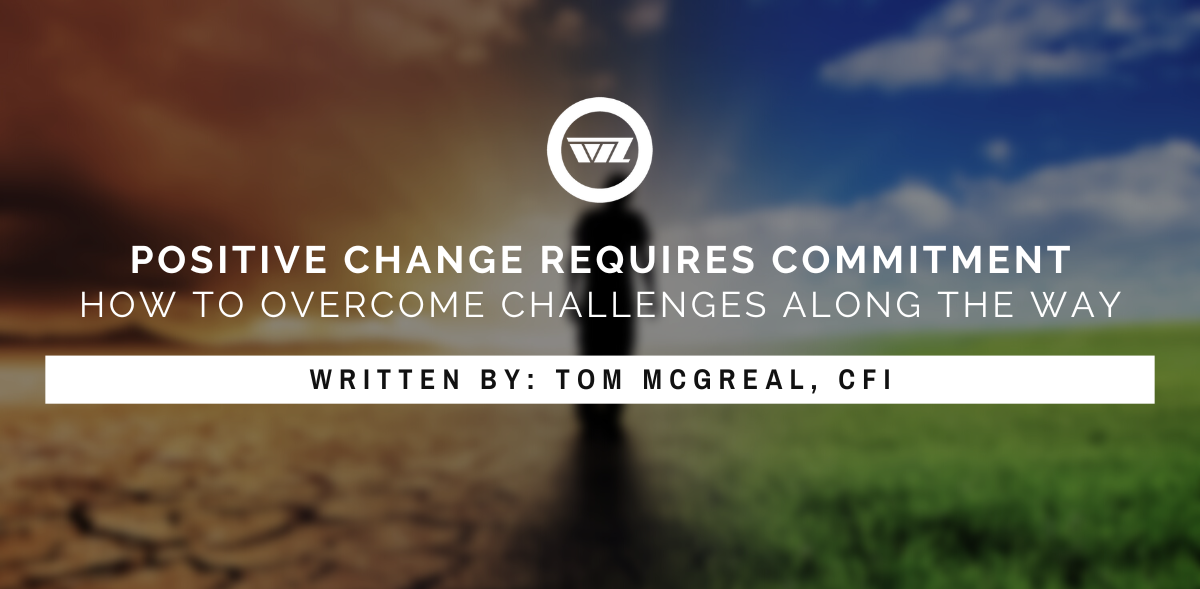“To be an effective investigative interviewer, one must first attend the International Association of Interviewer’s annual conference, Elite Training Days.”
Sherlock Holmes
While Sherlock Holmes never uttered the above statement (that we know of), we like to believe that if he was real, he would share in this sentiment with us. Elite Training Days (ETD 2023), is happening on October 24-25, 2023, on the San Antonio Riverwalk! Every year, the team at IAI works to source some of the most credible, progressive, and influential minds to educate attendees on all aspects of investigative interviewing. This year, we have stayed true to that tradition and will be hosting the most stacked line-up of speakers in ETD history!
We could tell you all about it, or ask some of the over 6,500 IAI members what ETD events they are most excited about, but there’s only one opinion that truly matters: yours. That’s why, through means that we can’t disclose, we reached out to the most effective version of yourself. That’s the version of yourself that took Sherlock Holmes’ advice and joined us in Texas. We asked them to write you a letter from the future; YOUR future, full of your own potential. We wanted you to hear about the sessions you could be attending and the lessons you could be taking away, and how the investment you made in yourself when you registered for ETD paid off and then some.
There is so much learning to be done at ETD that we’ll be sharing this correspondence in two parts.
“Dear past self—
I am reaching out to share what we experienced at Elite Training Days. First off, the San Antonio Riverwalk was such a fun location! Between the incredible restaurants, the fun bars, and the scenic views—I can’t wait for us to go back! All the fun stuff aside, I want to share some of the educational takeaways I learned from the event. While I enjoyed every session, I especially appreciated the diverse range of topics that were covered—vicarious trauma, cognitive bias, scientific principles and interviewing, negotiation strategies, intelligence interviewing, retail case studies, and motivational interviewing—made for a jam packed two days!
Dr. Erica Adkins’, PhD, is a licensed, board-certified counseling psychologist. Her presentation, “Hurting When They Hurt: Vicarious Trauma and the Interview Process”, was such an enlightening experience. Dr. Adkins walked through the challenging reality that comes with interviewing people who are facing significant consequences after the conversation ends. Anytime I conduct an investigative interview, I always prioritize treating them with respect and empathizing with them throughout the interaction. What Dr. Adkins presentation did for me, is call attention to the one person I fail to “notice” during the interview—myself. Constantly speaking with people who have made poor choices, pouring my emotional energy into those interactions, and doing everything I can to create an “approachable” environment, starts to take a mental toll on us as interviewers. I never thought about the mental health impact that I am experiencing every time I conduct an interview. I now understand how constant exposure to other people’s trauma, is actually traumatizing for me. I left with a better awareness of my own mental health, and most importantly, with some tools to help me effectively cope and grow through those challenges.
Dr. Jeff Kukucka, PhD, is an associate professor of psychology at Towson University. He talked about a topic I had never really heard before, “cognitive bias”. I have always been interested in learning more about “bias” since there are so many ways it tends to present itself during the investigative process. As an interviewer, making sure I understand what’s motivating me throughout my investigation and more specifically, during the interview, is critical to ensure an intentional objective approach. Dr. Kukucka discussed how bias isn’t inherently “bad”. He explained how cognitive bias can actually be beneficial to the interview process—but more importantly, he highlighted areas where it can cause devasting errors in decision-making.
Bruce Pitt Payne’s presentation was not only educational, but it made me optimistic about the future of investigative interviewing. Bruce is a retired investigator with the Royal Canadian Mounted Police (RCMP) and is a staunch advocate of science-based investigative interviewing. Bruce discussed how investigative interviewing has evolved over the decades and shared why leaning into “scientific principles” with interview training is critical. Through video examples, Bruce shared the right (and the wrong) way to conduct investigative interviews. I especially liked how he introduced a few investigative interviewing methods I had never heard of—the “Strategic Use of Evidence”, Conversation Management, and the Cognitive Interview. I walked away from his presentation feeling excited about the future of the industry, but most importantly hungry to learn more about some of the evidence-based approaches he shared.”
One thing is clear—this will be the ONLY event of the year where interviewers from both the public and private sectors can come together for an educational, collaborative, and interactive conference experience. We are on record pace for attendance this year and we want YOU to turn the fantasy above into reality by joining us!
If you haven’t registered yet, please visit CertifiedInterviewer.com to learn more about the conference and to secure your spot, today!
“Find a group of people who challenge and inspire you, spend a lot of time with them, and it will change your life.”
Amy Poehler
Tony Paixão, CFE, CFI, is a Certified Forensic Interviewer, speaker and consultant for Wicklander-Zulawski & Associates, Inc. (WZ). Tony has served in a variety of roles both in the public and private sectors. He is also an active member of the International Association of Interviewers (IAI). Tony has conducted investigations and interrogations for hundreds of cases ranging from retail fraud to homicide to sexual assault and employee relations matters.



